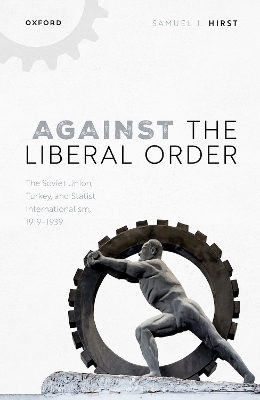
Against the Liberal Order
The Soviet Union, Turkey, and Statist Internationalism, 1919-1939
Seiten
2024
Oxford University Press (Verlag)
978-0-19-891662-8 (ISBN)
Oxford University Press (Verlag)
978-0-19-891662-8 (ISBN)
This book offers a groundbreaking account of interactions between the interwar Soviet Union and early Republican Turkey, uncovering a Soviet-Turkish 'statist internationalism' that arose as a direct response/reaction to the Western-led 'Paris order' and that continues to shape the world today.
In the aftermath of the First World War the Western great powers sought to redefine international norms according to their liberal vision. They introduced Western-led multilateral organizations to regulate cross-border flows which became pivotal in the making of an interconnected global order. In contrast to this well-studied transformation, Hirst considers in detail for the first time the responses of the defeated interwar Soviet Union and early Republican Turkey who challenged this new order with a reactive and distinctly state-led international politics.
As Mustafa Kemal Atatürk took up arms in 1920 to overturn the terms of the Paris settlement, Vladimir Lenin provided military and economic aid as part of a partnership that both sides described as anti-imperialist. Over the course of the next two decades, the Soviet and Turkish states coordinated joint measures to accelerate development in spheres ranging from aviation to linguistics. Most importantly, Soviet engineers and architects helped colleagues in Ankara launch a five-year plan and build massive state-owned factories to produce textiles and replace Western imports. Whilst the Kemalists' cooperation with the Bolsheviks has often been described as pragmatic, this book demonstrates that Moscow and Ankara actually came together in an ideological convergence rooted in anxiety about underdevelopment relative to the West, gradually arriving at statist internationalism as an alternative to Western liberal internationalism.
Drawing on extensive archival research and offering an often-ignored and non-Western perspective on the history of international relations and diplomacy, Against the Liberal Order presents a novel interpretation of the international order of the interwar period that crosses the borders of historical disciplines and contributes to questions of current concern in world politics.
In the aftermath of the First World War the Western great powers sought to redefine international norms according to their liberal vision. They introduced Western-led multilateral organizations to regulate cross-border flows which became pivotal in the making of an interconnected global order. In contrast to this well-studied transformation, Hirst considers in detail for the first time the responses of the defeated interwar Soviet Union and early Republican Turkey who challenged this new order with a reactive and distinctly state-led international politics.
As Mustafa Kemal Atatürk took up arms in 1920 to overturn the terms of the Paris settlement, Vladimir Lenin provided military and economic aid as part of a partnership that both sides described as anti-imperialist. Over the course of the next two decades, the Soviet and Turkish states coordinated joint measures to accelerate development in spheres ranging from aviation to linguistics. Most importantly, Soviet engineers and architects helped colleagues in Ankara launch a five-year plan and build massive state-owned factories to produce textiles and replace Western imports. Whilst the Kemalists' cooperation with the Bolsheviks has often been described as pragmatic, this book demonstrates that Moscow and Ankara actually came together in an ideological convergence rooted in anxiety about underdevelopment relative to the West, gradually arriving at statist internationalism as an alternative to Western liberal internationalism.
Drawing on extensive archival research and offering an often-ignored and non-Western perspective on the history of international relations and diplomacy, Against the Liberal Order presents a novel interpretation of the international order of the interwar period that crosses the borders of historical disciplines and contributes to questions of current concern in world politics.
Samuel J. Hirst teaches the history of international relations at Bilkent University. Since receiving a PhD in history from the University of Pennsylvania in 2012, he has lived and taught in St. Petersburg and Ankara. He is fluent in Russian and Turkish, and his research draws on extensive work in multiple archives.
Acknowledgments
Note on Names
List of Figures
Map
Introduction
1: Revolutionary Diplomacy
2: Sovereignty for a Post-Imperial Eurasia
3: Fair Trade
4: International Capital and Local Collaborators
5: The Factory and Development
6: Statist Internationalism
Epilogue
Bibliography
Index
| Erscheinungsdatum | 21.08.2024 |
|---|---|
| Zusatzinfo | 16 black-and-white figures/maps |
| Verlagsort | Oxford |
| Sprache | englisch |
| Maße | 163 x 243 mm |
| Gewicht | 556 g |
| Themenwelt | Geschichte ► Allgemeine Geschichte ► Neuzeit (bis 1918) |
| Geisteswissenschaften ► Geschichte ► Regional- / Ländergeschichte | |
| ISBN-10 | 0-19-891662-0 / 0198916620 |
| ISBN-13 | 978-0-19-891662-8 / 9780198916628 |
| Zustand | Neuware |
| Informationen gemäß Produktsicherheitsverordnung (GPSR) | |
| Haben Sie eine Frage zum Produkt? |
Mehr entdecken
aus dem Bereich
aus dem Bereich
Giordano Bruno - ein ketzerisches Leben
Buch | Hardcover (2024)
C.H.Beck (Verlag)
CHF 41,85
das dramatische 16. Jahrhundert
Buch | Hardcover (2024)
Rowohlt Berlin (Verlag)
CHF 47,60


